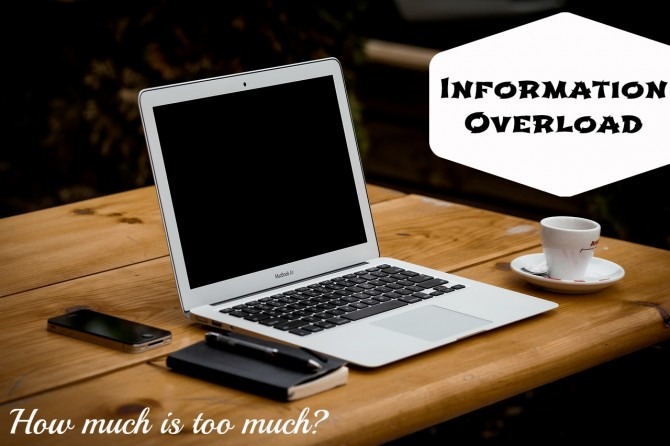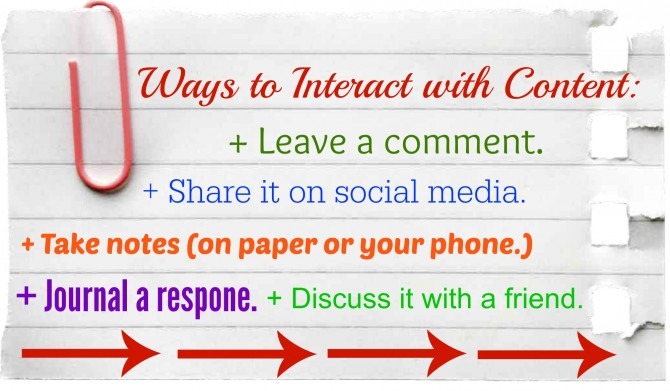A few weeks ago my husband asked me a startling question: “Do you think I consume too much information?” My initial response was: No, of course not! There is no such thing as TOO MUCH INFORMATION! Information = knowledge, and knowledge is power. (And apparently those Schoolhouse Rock videos made an indelible impression on my young mind!) But then Luke began to elaborate, and I started to understand his perspective.
Luke explained that he was finding himself spending an exorbitant amount of time reading (blogs and books), listening to podcasts, and watching webinars; most of these resources were geared toward helping him improve in his work and grow his platform, but Luke was beginning to feel like he was dedicating all of his time to absorbing content, often to the point of over saturation. Not only was his intake of information stealing time that Luke could have spent being a producer himself, but because the quantity of input was so vast, Luke wasn’t able to attain – let alone apply – a majority of what he was learning. As a result, Luke made a decision to cut back on his personal education endeavors in order to begin implementing the many things he had invested so much time in learning.
As is so often the case with spouses, Luke’s personal quandary led me to question my own “content intake.” Was I suffering from the same problem? How much of what I was reading/watching/listening to was impacting my life in a meaningful way, and how much had become … for lack of a better word … fluff? Was I, too, suffering from information overload?
There is no denying the fact that our society consumes more information than any previous generation. The Internet, fueled by the increased connectivity offered by our various digital devices, has ushered in a deluge of information. Though I can’t speak for everyone, I know that I do my fair share of consumption: I subscribe to nearly fifty blogs (many of which post daily), regularly listen to eighteen different podcasts, and read (or listen to) a couple of books each week. And we can’t forget about the abundance of articles that are shared on social media, or the embarrassingly large amount of time I spend on Wikipedia “researching” random topics that cross my path. That all adds up to a fairly high volume of information.
As I reflected on my content intake, I realized that I differ from Luke in a couple of key ways: unlike my husband, whose information intake fell primarily into the categories of self-improvement and business development, much of my own content consumption is of the lighthearted variety: cooking and fashion blogs, faith-based podcasts, etc. Rather than being weighed down by these resources, I genuinely find that they bring me personal enjoyment, encouragement, and sometimes even lead to personal improvements. My situation is also different from Luke’s in that my content consumption hasn’t resulted in a decrease of my personal output. On the contrary, the Internet has been a huge source of inspiration for me in my work (there are some great teacher resources), around the home (I’m not sure how anyone cooked pre-Pinterest) and on my blog.
After mulling over these thoughts for the past few weeks, I’ve come to the conclusion that I don’t have a personal problem with information overload, at least not at this point in my life. Though I think that Luke made the right decision for himself, I don’t personally feel the need to cut back on the amount of content I consume. Nevertheless, I’ve realized that I want more out of the resources I am allowing into my life: I don’t want to breeze through a blog post or podcast, just so that I can jump right into the next one. If I am going to dedicate my time to consuming information, I want it to leave an impact.
So how can I make that happen? I think the key is to be more intentional about how I interact with and respond to content as it crosses my path. This can take various forms: commenting on a blog post, sharing an article on social media (which inevitably leads to some interesting discussions), taking notes on a podcast in Evernote, journaling about my response to a novel in Day One . . . the options are endless, it’s simply a matter of being intentional. I also recognize that not every blog or podcast is worthy of that type of investment, and I’m giving myself permission at times to simply consume and move on (or even skim or skip an article altogether if it’s just not speaking to me). Eventually, I might find myself paring down my content streams so that I can invest more emotional energy in the areas that are more meaningful to me; only time will tell how my personal experiment will pan out.
I would love to hear your thoughts on this issue: do you feel like you are suffering from information overload? How do you manage the content that enters your life on a daily basis? What strategies do you use to derive meaning from your content consumption? Make a move to interact with THIS content by leaving a comment! 🙂

